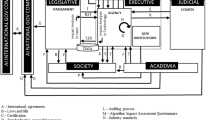Abstract
Developing an interface between knowledge holders, stakeholders and decision makers on biodiversity issues, just as any science-policy interface, will face many challenges. In the crucial endeavour to tackle all those challenges, determining an ethical course of actions will be essential to the prestige and credibility of such an interface. The paper identifies and assesses potential ethical risks that may arise in interactions between science, society and policy and uses the Network of Knowledge (NoK) process as an example to show how an ethical infrastructure could be developed for minimizing the ethical risks and their potential consequences. Indeed, when various actors from different spheres (politics, academia, lobbyism, media, etc.) are called upon to interact within one process as complex as the NoK, the integrity and credibility of the latter are at high risk of being compromised if the ethical risks are not adequately addressed. In order to limit those risks, which science-policy interfaces such as IPCC and IPBES have already encountered, we propose to set up an ethical governance infrastructure that will guide (and regulate) interactions among internal actors of the NoK (knowledge coordination body, secretariat, expert working groups, etc.) as well as with external actors (requesters, stakeholders, etc.). A thorough evaluation of the interaction between the actors for every step of the process is carried out and potential ethical risks are identified. Suggestions as to how the risks can be handled and prevented are presented and integrated as part of an ethical infrastructure. The main objective of the paper is to address how a science-policy interface and the scientific community as a whole would benefit from implementing ethical measures and instruments to help prevent sensitive issues and undesired consequences undermining credibility and legitimacy.
Similar content being viewed by others
Notes
http://ipcc.ch/organization/organization_review.shtml#.UIE_UsWkqTV,%20see%20also%20www.ipcc.ch/apps/future, last accessed April 13th 2016.
For further information: see http://www.eklipse-mechanism.eu.
References
Beck S (2012) Between Tribalism and Trust: The IPCC Under the public microscope. Nat Cult 7(2):151–173
Beck S, Borie M, Esguerra A, Chilvers J, Heubach K, Hulme M, Lidskog R, Lövbrand E, Marquard E, Miller C, Nadim T, Nesshöver C, Settele J, Turnhout E, Vasileiadou E, Görg C (2014) Towards a reflexive turn in the governance of global environmental expertise. The cases of the IPCC and the IPBES. GAIA 23(2):80–87. doi:10.14512/gaia.23.2.4
Bertok J, Beth E (2005) Public sector integrity a framework for assessment. OECD, France
Foucart S (2014) Expert : le contrat de défiance. Le Monde, 11 Novembre 2014
Görg C et al (2016) The Governance of Science-Policy Interfaces—Network vs. Platform approach. Biodivers Conserv. doi:10.1007/s10531-016-1132-8
Hajer M (2012) A media storm in the world risk society: enacting scientific authority in the IPCC controversy (2009–10). Crit Policy Stud 6(4):452–464
Heink U, Marquard E, Heubach K, Jax K, Kugel C, Nesshöver C, Neumann CK, Paulsch A, Tilch S, Timaeus J, Vandewalle M (2015) Conceptualizing credibility, relevance and legitimacy for evaluating the effectiveness of science–policy interfaces: challenges and opportunities. Sci Public Policy 42(5):676–689
Huberts L (2014) The integrity of Governance. Houndmills, Basingstoke
KNEU Team (2014) A recommended design for “BiodiversityKnowledge”, a Network of Knowledge to support decision making on biodiversity and ecosystem services in Europe. Leipzig
Kolthoff EW (2007) Ethics and new public management: Empirical Research into the Effects of Businesslike Government on Ethics and Integrity. Vrije Universiteit, Amsterdam
Larigauderie A (2015) Pollinator assessment: IPBES responds on conflicts of interest. Nature 517(7534):271. doi:10.1038/517271e
Livoreil B, Geijzendorffer IR, Pullin AS, Schindler S, Vandewalle M, Nesshöver C (2016) Biodiversity knowledge synthesis at the European scale: actors and steps. Biodivers Conserv. doi:10.1007/s10531-016-1143-5
Loosdregt H-B (2004) Prévenir les risques éthiques de votre entreprise: guide pratique à l’usage des dirigeants. INSEP consulting, Paris
Maesschalck J (2004) Approaches to ethics management in the public sector: a proposed extension of the compliance-integrity. Public Integrity 7(1):20–41
Nesshöver C et al (2016) The Network of Knowledge approach—improving the science and society dialogue on biodiversity and ecosystem services in Europe. Biodivers Conserv. doi: 10.1007/s10531-016-1127-5
OECD (2000) Getting the public ethics right. Observer 220. Online: Accessed 14 Feb 2016
Paine LS (1994) Managing for organizational integrity. Harvard Bus Rev 72(2):106–117
Treviño L, Weaver GR (2003) Managing ethics in business organizations: social scientific perspective. Stanford University Press, Stanford
Van den Hove S (2007) A rationale for science policy interfaces. Futures 39:807–826
Weible CM (2007) Stakeholder perceptions of scientists: Lake Tahoe environmental policy from 1984 to 2001. Environ Manage 40:853–865
Acknowledgments
The work presented in this paper has been partly financed by the European Commission via its 7th framework programme. The main development of the Biodiversity Knowledge mechanism was conducted in the KNEU project (Grant no. 265299). We are grateful for the contributions of our colleagues from the KNEU-consortium, and three referees of the journal.
Author information
Authors and Affiliations
Corresponding author
Ethics declarations
Conflict of interest
The authors declare that they have no conflict of interest.
Additional information
Communicated by Barbara Livoreil.
Maryse Tremblay and Marie Vandewalle contributed equally.
This is part of the special issue on Networking Biodiversity Knowledge.
Rights and permissions
About this article
Cite this article
Tremblay, M., Vandewalle, M. & Wittmer, H. Ethical challenges at the science-policy interface: an ethical risk assessment and proposition of an ethical infrastructure. Biodivers Conserv 25, 1253–1267 (2016). https://doi.org/10.1007/s10531-016-1123-9
Received:
Revised:
Accepted:
Published:
Issue Date:
DOI: https://doi.org/10.1007/s10531-016-1123-9




